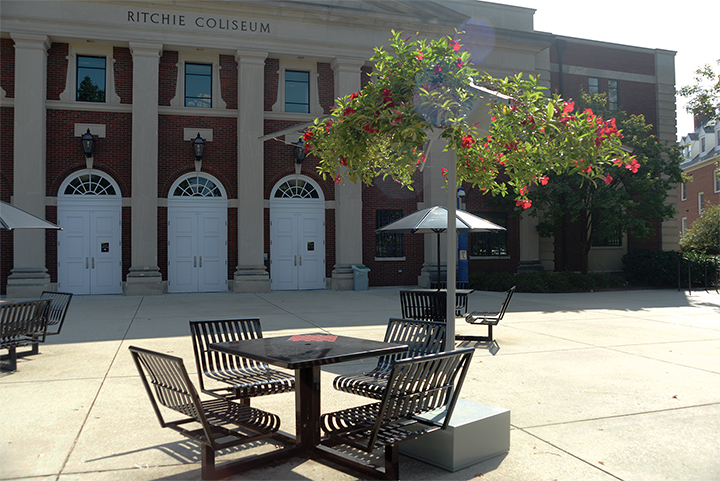Laptop and cellphone batteries can limit students’ ability to study outside, but that may soon change with the introduction of solar-powered charging stations at the University of Maryland.
Last year, the College of Behavioral and Social Sciences’ Sustainability Task Force applied for and received $5,000 for outdoor charging stations through the university’s sustainability fund, which awards grants to support sustainability efforts on the campus, said Adriane Michaelis, the task force’s adviser.
Options for stations range from cheaper, simpler benches to picnic tables with solar umbrellas, said Michaelis, a third-year anthropology doctoral student. While the task force has not yet finalized which type of station it will install, Michaelis said they are planning to have a picnic table with a solar umbrella in place this spring. Users will be able to plug into the station to charge their personal devices, though the team also isn’t sure yet what the maximum power allotted will be, Michaelis said. The power available at the charging stations will be limited and will depend on natural factors such as the weather, she added. In addition to supporting the college’s goals of being more sustainable — in this case by using solar power, a clean energy source — senior geographical information systems major Isaac Zhodzishsky said they will also allow students to avoid being “pent up” working in the library.
After BSOS developed a sustainability plan in 2013, the BSOS Sustainability Task Force was born in fall 2014 to help improve the college’s sustainability. The university as a whole has a sustainability plan, but BSOS is the first college to have its own plan, Michaelis said.
The next project the group is working on is an energy-tracking device that will eventually allow individuals to monitor their personal energy use within BSOS buildings, Michaelis said, since energy usage is currently tracked by each building as a whole. The goal is to eventually allow every faculty or staff member to track the energy usage of their own office or classroom, she added.
“We have a really great administration that’s set a lot of fantastic goals for our carbon levels over the next few decades, but to make sure they’re met we need people to make sure they happen,” said Jane Lyons, a junior economics major who joined the task force during its first semester.
The group of students develops ideas to improve campus sustainability, then works to bring them to life, Michaelis said. The task force also runs a one-credit sustainability course, which was created to help students become more involved and have their voices heard in the effort, she added.
The focus of the course each semester depends on the individual interests of the students, Michaelis said. This semester the task force includes five students, and the cap on the class is 20. Last semester there were 10 students on the task force, but many graduated.
“Having this hands-on experience as an undergraduate student is not only valuable to students but also to the spreading of ideas,” Zhodzishsky said.



